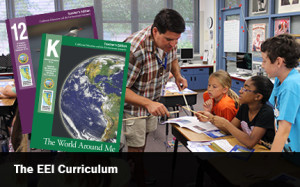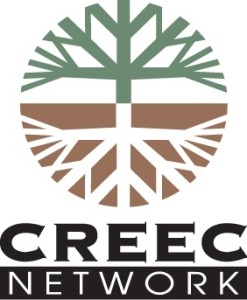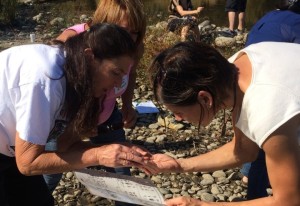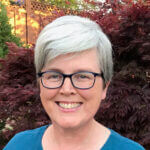Fish are jumpin’ and we’re gearing up for a busy summer at Ten Strands!
We’ll be supporting and participating in three professional learning institutes in June, July, and August.
The first event is the EEI Teacher Ambassador Training Institute (TA Institute) which will be held at the Lake Natoma Inn in Folsom, California. This is the third year we’ve sponsored this event and it’s growing by leaps and bounds. Ariel captured her experience at last year’s event in her blog post, Champion Teachers.
We support the TA Institute because we believe it’s essential that teachers collaborate with teachers when considering adopting new instructional materials. The Teacher Ambassadors are teachers who have successfully introduced the Education and Environment Initiative (EEI) Curriculum to their students and are eager to introduce the Curriculum to teachers all over California. During the 2014-15 school year the Teacher Ambassadors, in partnership with the staff at the Office of Education and the Environment (OEE), ran over 200 workshops and trained over 4,400 teachers—an increase of 53% and 71% over the prior year respectively. The TA Institute is an opportunity for experienced and new TAs to come together to reflect, share success stories, and get the training needed for another busy year ahead.
believe it’s essential that teachers collaborate with teachers when considering adopting new instructional materials. The Teacher Ambassadors are teachers who have successfully introduced the Education and Environment Initiative (EEI) Curriculum to their students and are eager to introduce the Curriculum to teachers all over California. During the 2014-15 school year the Teacher Ambassadors, in partnership with the staff at the Office of Education and the Environment (OEE), ran over 200 workshops and trained over 4,400 teachers—an increase of 53% and 71% over the prior year respectively. The TA Institute is an opportunity for experienced and new TAs to come together to reflect, share success stories, and get the training needed for another busy year ahead.
A focus of this year’s institute will be the Next Generation Science Standards (NGSS). We know teachers are beginning to think about NGSS, so it’s important the TAs are able to deeply demonstrate why the EEI Curriculum is an extremely useful transitional instructional resource for NGSS. In addition to learning about the three dimensions of NGSS (written about here by Dr. Jerry Lieberman and here by me), we’ll also be demonstrating how California’s adopted Environmental Principles and Concepts (EP&Cs) map to NGSS and in turn tie back to the EEI Curriculum units. We’ll be bringing in experts to help, including Dr. Jerry Lieberman from SEER and Chris Breazeale from the California Department of Education (CDE). Chris is the Education Program Consultant for the STEM office at CDE and he’s responsible for the statewide rollout of NGSS. We couldn’t be in better hands.
 In addition to NGSS, we’ll be discussing the Common Core State Standards (CCSS) connections, best practices and inspired approaches, and partnership opportunities. Regarding partnerships, for the first time we’ll have representatives from the Alliance for Climate Education (ACE) and the California Regional Environmental Education Community (CREEC) joining us. The ACE partnership was created this year when Ten Strands, OEE, and ACE worked together to correlate the EEI climate education content to the ACE assembly content. This means that when ACE gives an assembly they will also introduce teachers to the EEI Curriculum as it’s relevant to their high school content. (Special thanks to Teacher Ambassador Laura Walls for creating the correlation!)
In addition to NGSS, we’ll be discussing the Common Core State Standards (CCSS) connections, best practices and inspired approaches, and partnership opportunities. Regarding partnerships, for the first time we’ll have representatives from the Alliance for Climate Education (ACE) and the California Regional Environmental Education Community (CREEC) joining us. The ACE partnership was created this year when Ten Strands, OEE, and ACE worked together to correlate the EEI climate education content to the ACE assembly content. This means that when ACE gives an assembly they will also introduce teachers to the EEI Curriculum as it’s relevant to their high school content. (Special thanks to Teacher Ambassador Laura Walls for creating the correlation!)
The CREEC network of consultants has represented the EEI Curriculum for many years and they are a crucial component of our outreach efforts. However, there has never been an opportunity for OEE and CREEC to meet in an institute setting. Ten Strands is happy to support these two groups coming together to work shoulder-to-shoulder for the first time.
for many years and they are a crucial component of our outreach efforts. However, there has never been an opportunity for OEE and CREEC to meet in an institute setting. Ten Strands is happy to support these two groups coming together to work shoulder-to-shoulder for the first time.
We have a packed agenda that has some outdoor time built in too. We’ll be kayaking on the American River. You can’t very well spend two days talking about environmental literacy and not get outside. We practice what we preach at Ten Strands!
The remaining two events we’ll be supporting are the San Mateo Environmental Learning Collaborative (SMELC) institutes. We’ll be working with the STEM Center at San Mateo County Office of Education, San Mateo Outdoor Education (SMOE), SEER, OEE, Hidden Villa, Project Wet, Marine Science Institute, Pie Ranch, Project Learning Tree, and RecycleWorks. Phew!
Here too, the focus will be NGSS. We’ll be working with 90 elementary and middle school teachers from all over San Mateo Country to introduce them to the big ideas in NGSS—the three dimensions of learning as characterized by disciplinary core ideas (DCIs), crosscutting concepts (CCs) and science and engineering practices (SEPs). The institutes will be held at the new state of the art STEM Center at San Mateo Country of Education. We decided to focus on elementary teachers because many have not taught much science in the last decade (due to the overwhelming focus on mathematics and English language arts), and middle school teachers because California is recommending an integrated sequence for science in middle school, and this too will be new to many teachers.
During the institutes we’ll introduce teachers to NGSS, the EP&Cs, systems thinking, and service-learning and then we’ll work together—teachers and all the project partners—to create NGSS units of study that use environmental topics for context. The EEI Curriculum will be a valuable resource for the units of study as will the instructional resources from our nonformal environmental education providers. After the institutes, teachers will continue to work on their units of study with their teams, and during the fall they will begin implementing them with their students. The two cohorts will come back together again in late fall and report out on how their environment-based units of study were received by their students. We’ll also be encouraging teachers to extend the classroom experience and take their students outside to take advantage of the lesson extension opportunities provided by our partners.
In a letter of support we received from State Superintendent of Public Instruction Tom Torlakson, he said “This project, proposed by Ten Strands in partnership with San Mateo County Office of Education, will stand as a model for environment-based professional learning in California. Programs for educators, such as the one proposed by Ten Strands, will serve the professional learning needs of teachers by offering workshops that prepare them to teach to the depth and rigor required by the new science standards using environment-based applications.” He goes on to say “I strongly support this initiative and believe this collaboration will assist educators with the implementation of the CA NGSS while increasing environmental literacy for future generations.”
Our work at Ten Strands lives at the intersection of education and the environment. Our work this summer will continue to demonstrate this commitment in ways that make sense to teachers reconnecting to science as well as our experienced EEI Teacher Ambassadors. We look forward to rolling up our sleeves and digging in.


